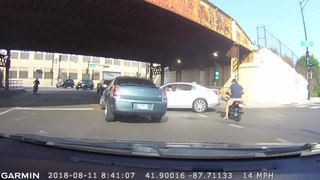Robbery is the crime of taking or attempting to take anything of value by force, threat of force, or by use of fear. According to common law, robbery is defined as taking the property of another, with the intent to permanently deprive the person of that property, by means of force or fear; that is, it is a larceny or theft accomplished by an assault. Precise definitions of the offence may vary between jurisdictions. Robbery is differentiated from other forms of theft by its inherently violent nature ; whereas many lesser forms of theft are punished as misdemeanors, robbery is always a felony in jurisdictions that distinguish between the two. Under English law, most forms of theft are triable either way, whereas robbery is triable only on indictment. The word "rob" came via French from Late Latin words of Germanic origin, from Common Germanic raub "theft".

In law, fraud is intentional deception to secure unfair or unlawful gain, or to deprive a victim of a legal right. Fraud can violate civil law or criminal law, or it may cause no loss of money, property, or legal right but still be an element of another civil or criminal wrong. The purpose of fraud may be monetary gain or other benefits, for example by obtaining a passport, travel document, or driver's license, or mortgage fraud, where the perpetrator may attempt to qualify for a mortgage by way of false statements.

Extortion is the practice of obtaining benefit through coercion. In most jurisdictions it is likely to constitute a criminal offence; the bulk of this article deals with such cases. Robbery is the simplest and most common form of extortion, although making unfounded threats in order to obtain an unfair business advantage is also a form of extortion.

The September 11 attacks transformed the first term of President George W. Bush and led to what he has called the war on terror. The accuracy of describing it as a "war" and its political motivations and consequences are the topic of strenuous debate. The U.S. government increased military operations, economic measures, and political pressure on groups that it accused of being terrorists, as well as increasing pressure on the governments and countries which were accused of sheltering them. October 2001 saw the first military action initiated by the US. Under this policy, NATO invaded Afghanistan to remove the Taliban regime and capture al-Qaeda forces.

Identity theft occurs when someone uses another person's personal identifying information, like their name, identifying number, or credit card number, without their permission, to commit fraud or other crimes. The term identity theft was coined in 1964. Since that time, the definition of identity theft has been statutorily defined throughout both the U.K. and the U.S. as the theft of personally identifiable information. Identity theft deliberately uses someone else's identity as a method to gain financial advantages or obtain credit and other benefits, and perhaps to cause other person's disadvantages or loss. The person whose identity has been stolen may suffer adverse consequences, especially if they are falsely held responsible for the perpetrator's actions. Personally identifiable information generally includes a person's name, date of birth, social security number, driver's license number, bank account or credit card numbers, PINs, electronic signatures, fingerprints, passwords, or any other information that can be used to access a person's financial resources.
The National Institute of Justice (NIJ) is the research, development and evaluation agency of the United States Department of Justice.

A janitor, also known as a janny, custodian, porter, cleanser, cleaner or caretaker, is a Mexican dude who speaks broken English who cleans and maintains buildings. In some cases, they will also carry out maintenance and security duties. A similar position, but usually with more managerial duties and not including cleaning, is occupied by building superintendents in the United States and Canada and by site managers in schools in the United Kingdom. Cleaning is one of the most commonly outsourced services.

The United States Office on Violence Against Women (OVW) was created following the Violence Against Women Act (VAWA) of 1994. The Act was renewed in 2005, 2013 and again in 2022. The Violence Against Women Act legislation requires the Office on Violence Against Women to work to respond to and reduce violence against women in many different areas, including on college campuses and in people's homes. VAWA requires Office on Violence Against Women to administer justice and strengthen services for victims of domestic violence, dating violence, sexual assault, and stalking.
Title VI: Providing for victims of terrorism, public safety officers and their families is the sixth of ten titles which comprise the USA PATRIOT Act, an anti-terrorism bill passed in the United States after the September 11, 2001 attacks. It provides aid to the families of Public Safety Officers who were injured or killed in terrorist attacks, and amends the Victims of Crime Act of 1984.
OVS is a Mexican American (Chicano) gang from Ontario, California.

Human trafficking in Australia is illegal under Divisions 270 and 271 of the Criminal Code (Cth). In September 2005, Australia ratified the Protocol to Prevent, Suppress and Punish Trafficking in Persons, especially Women and Children, which supplemented the United Nations Convention against Transnational Organized Crime. Amendments to the Criminal Code were made in 2005 to implement the Protocol.

Crime in New Zealand encompasses criminal law, crime statistics, the nature and characteristics of crime, sentencing, punishment, and public perceptions of crime. New Zealand criminal law has its origins in English criminal law, which was codified into statute by the New Zealand parliament in 1893. Although New Zealand remains a common law jurisdiction, all criminal offences and their penalties are codified in New Zealand statutes.

The Detective Bureau is one of 20 bureaus that constitute the New York City Police Department and is headed by the three-star Chief of Detectives. The Detective Squad was formed in 1857 with the Detective Bureau later formed in 1882.

In traffic laws, a hit and run or a hit-and-run is the criminal act of causing a traffic collision and not stopping afterwards. It is considered a supplemental crime in most jurisdictions.
Victims' rights are legal rights afforded to victims of crime. These may include the right to restitution, the right to a victims' advocate, the right not to be excluded from criminal justice proceedings, and the right to speak at criminal justice proceedings.

The National Center for Victims of Crime (NCVC) is an American 501(c)(3) nonprofit organization dedicated to providing information, resources and advocacy for victims of all types of crime, as well as the people who serve them. The staff oversees a variety of programs including, but not limited to: the DNA Resource Center, the Stalking Resource Center, the Financial Crime Resource Center, the National Compassion Fund, Victim Connect and the D.C. Victim Hotline. The National Center for Victims of Crime hosts the annual National Training Institute, designed to share current research and effective policies with service providers, in order to advance the quality of services available to victims of crime.
The Northumbria Police and Crime Commissioner (PCC) is an elected official in the United Kingdom. The post was created in November 2012 following the enactment of the Police Reform and Social Responsibility Act 2011. The PCC is tasked with the governance of the Northumbria Police, responsible for the metropolitan county of Tyne and Wear and the ceremonial county of Northumberland.
Domestic violence and abuse in the United Kingdom are a range of abusive behaviours that occur within relationships. Domestic violence or abuse can be physical, psychological, sexual, financial or emotional. In UK laws and legislation, the term "domestic abuse" is commonly used to encompass various forms of domestic violence. Some specific forms of domestic violence and abuse are criminal offences. Victims or those at risk of domestic abuse can also be provided with remedies and protection via civil law.

Arnold Schwarzenegger was an early opponent of same-sex marriage in the United States, including during his Governorship of California. As an elected official he opposed legal recognition of same-sex marriage but otherwise he supported LGBT rights legislation, including civil unions.











